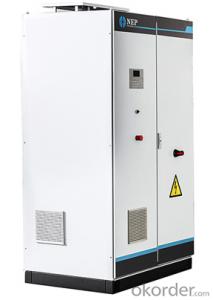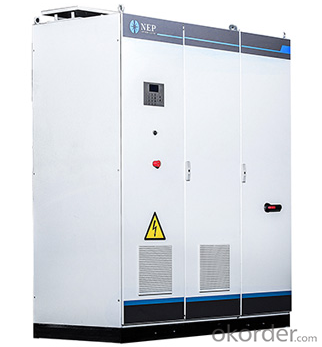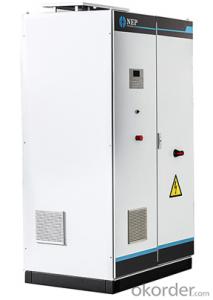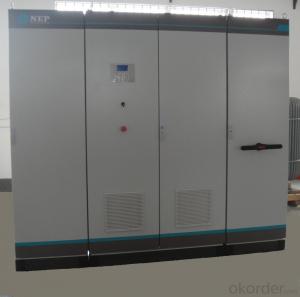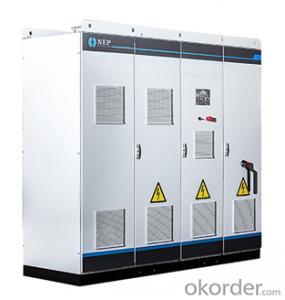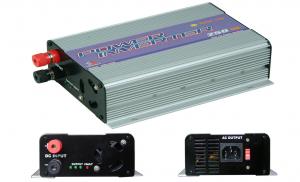Blue Solar Inverter Grid Tied Solar Inverter BDE-125K
- Loading Port:
- Qingdao
- Payment Terms:
- TT OR LC
- Min Order Qty:
- 10 unit
- Supply Capability:
- 1000 unit/month
OKorder Service Pledge
OKorder Financial Service
You Might Also Like
Description:
A solar micro-inverter, converts direct current (DC) electricity from a single solar panel to alternating current (AC). The electric power from several micro-inverters is combined and fed into an existing electrical grid. Micro-inverters contrast with conventional string or central inverter devices, which are connected to multiple solar panels.
Characteristic & Advantages:
More Energy Harvest: Distributed MPPT allows10~25% more energy harvest
Simple: Modularized,single ac cable to the house
Reliability: Longer life time and almost 100% operation hours
Security: No high Voltage, makes safter environments
Inteligent : Monitoring each module
Savings: No dc components and significantly save labor cost
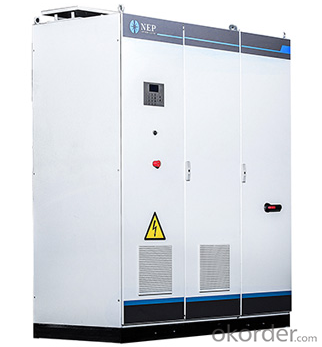
Datasheet:
BDE-125K | ||
(DC) | (kWp) | 137 |
(V) | 900 | |
(A) | 305 | |
MPPT | >99% | |
MPPT (V) | 450 - 820 | |
(AC) | (kW) | 125 |
(V) | 380 | |
(V) | 310-450 | |
(Hz) | 45.5—52.5 | |
THD | <3% ()< p=""> | |
| 0.92 () -- 0.92() | |
|
| 97.3%() |
| 96.9%() | |
(W) | <10< p=""> | |
|
| C (II) |
/ |
| |
/ |
| |
|
| |
|
| |
|
| |
|
| |
| IP20 | |
|
| -35℃ -- +50℃ |
| 0-95% RH | |
| 128*64 VFD | |
| RS485, RS232, , | |
(-- mm) | 800*1200*2200 | |
(kg) | 980 | |
- Q: How do you connect a solar inverter to a data monitoring system?
- To connect a solar inverter to a data monitoring system, you need to follow a few steps. First, ensure that your solar inverter is compatible with a data monitoring system. Next, connect the inverter to a local network, either wired or wireless, depending on the available options. Then, configure the inverter's settings to enable data transmission. Finally, install the required software or app provided by the data monitoring system and use the provided instructions to link the inverter to the monitoring system.
- Q: What are the safety measures to consider when installing a solar inverter?
- When installing a solar inverter, several safety measures should be considered. Firstly, it is important to ensure that the installation is performed by a qualified and certified professional to minimize the risk of accidents. It is crucial to follow the manufacturer's guidelines and recommendations during the installation process. Additionally, it is essential to disconnect the solar inverter from the power source before starting any installation or maintenance work to prevent electrocution. Proper grounding and wiring techniques should be followed to reduce the risk of electric shock or fire hazards. Adequate ventilation and temperature control should be provided to prevent overheating of the inverter. Regular inspections and maintenance checks should be conducted to ensure the inverter's safe and efficient operation. Overall, prioritizing safety measures during the installation process is crucial to protect both the installer and the system's end-users.
- Q: Can a solar inverter be used with solar-powered greenhouse systems?
- Yes, a solar inverter can be used with solar-powered greenhouse systems. A solar inverter is an essential component that converts the direct current (DC) generated by solar panels into alternating current (AC), which is required to power electrical devices in the greenhouse. By connecting the solar panels to the solar inverter, the greenhouse systems can effectively utilize the solar energy for various applications such as lighting, heating, and ventilation.
- Q: What are the advantages of using a solar inverter?
- There are several advantages of using a solar inverter. Firstly, a solar inverter converts the direct current (DC) generated by solar panels into alternating current (AC) that can be used to power household appliances and electrical devices. This allows for the efficient utilization of solar energy, reducing reliance on traditional fossil fuel-based electricity sources. Secondly, solar inverters enable the integration of solar power systems with the electrical grid. By synchronizing the generated electricity with the grid, excess power can be fed back into the grid, resulting in net metering or feed-in tariff benefits. This not only reduces electricity bills but also contributes to the overall renewable energy mix, promoting sustainability and reducing carbon emissions. Another advantage is the monitoring and control capabilities provided by solar inverters. Many modern inverters offer real-time monitoring of energy production, allowing users to track the performance of their solar panels and identify any potential issues. Additionally, inverters often come with built-in safety features, such as ground fault protection, to ensure the safe operation of the solar power system. Overall, the advantages of using a solar inverter include efficient conversion of solar energy into usable electricity, integration with the electrical grid, cost savings, environmental benefits, and enhanced monitoring and safety features.
- Q: Can a solar inverter be used with a time-of-use electricity tariff?
- Yes, a solar inverter can be used with a time-of-use electricity tariff. Time-of-use electricity tariffs typically involve different rates for electricity consumption based on the time of day. A solar inverter can be programmed to produce and export excess solar energy during peak times when electricity rates are higher, and import energy from the grid during off-peak times when rates are lower. This allows users to optimize their energy consumption and potentially save on electricity costs.
- Q: What is the role of a DC-DC converter in a solar inverter?
- The role of a DC-DC converter in a solar inverter is to convert the direct current (DC) generated by the solar panels into the appropriate voltage and current levels required for the inverter to convert it into alternating current (AC) electricity. The DC-DC converter ensures efficient power transfer and enables the solar inverter to maximize the energy harvested from the solar panels. Additionally, it helps regulate the voltage levels and maintain the stability of the solar power system.
- Q: How is the output voltage and frequency of a solar inverter regulated?
- The output voltage and frequency of a solar inverter are regulated through advanced control algorithms and feedback mechanisms. These control algorithms continuously monitor the input power generated by the solar panels and adjust the inverter's output voltage and frequency accordingly. The regulation process involves various components such as voltage regulators, frequency detectors, and digital signal processors that ensure the output voltage and frequency are in sync with the grid or the desired specifications. Additionally, some inverters may also have built-in mechanisms to protect against voltage and frequency fluctuations, ensuring a stable and reliable power supply to connected devices or the grid.
- Q: How does a solar inverter synchronize with the grid?
- A solar inverter synchronizes with the grid by constantly monitoring the grid's voltage and frequency. It adjusts its own output to match the grid's characteristics, ensuring that the electricity it generates is in phase with the grid's power supply. This synchronization process allows the solar inverter to seamlessly connect and feed electricity into the grid, maximizing the efficiency and reliability of the solar power system.
- Q: Can a solar inverter be used in remote areas?
- Yes, a solar inverter can be used in remote areas. Solar inverters are designed to convert the direct current (DC) generated by solar panels into alternating current (AC) that can be used to power electrical devices. As long as there is access to sunlight, solar panels can be installed in remote areas to generate electricity, and the solar inverter can then be used to convert and distribute that power for various applications. This makes solar inverters a useful and sustainable solution for remote areas that may not have access to grid electricity.
- Q: How does a solar inverter handle voltage flicker in the grid?
- A solar inverter handles voltage flicker in the grid by employing various control mechanisms. It continuously monitors the grid voltage and adjusts its own output accordingly to compensate for any fluctuations or flickering. By dynamically regulating its power output, the solar inverter helps stabilize the grid voltage and mitigate the impact of voltage flicker, ensuring a stable and reliable power supply.
Send your message to us
Blue Solar Inverter Grid Tied Solar Inverter BDE-125K
- Loading Port:
- Qingdao
- Payment Terms:
- TT OR LC
- Min Order Qty:
- 10 unit
- Supply Capability:
- 1000 unit/month
OKorder Service Pledge
OKorder Financial Service
Similar products
Hot products
Hot Searches
Related keywords
